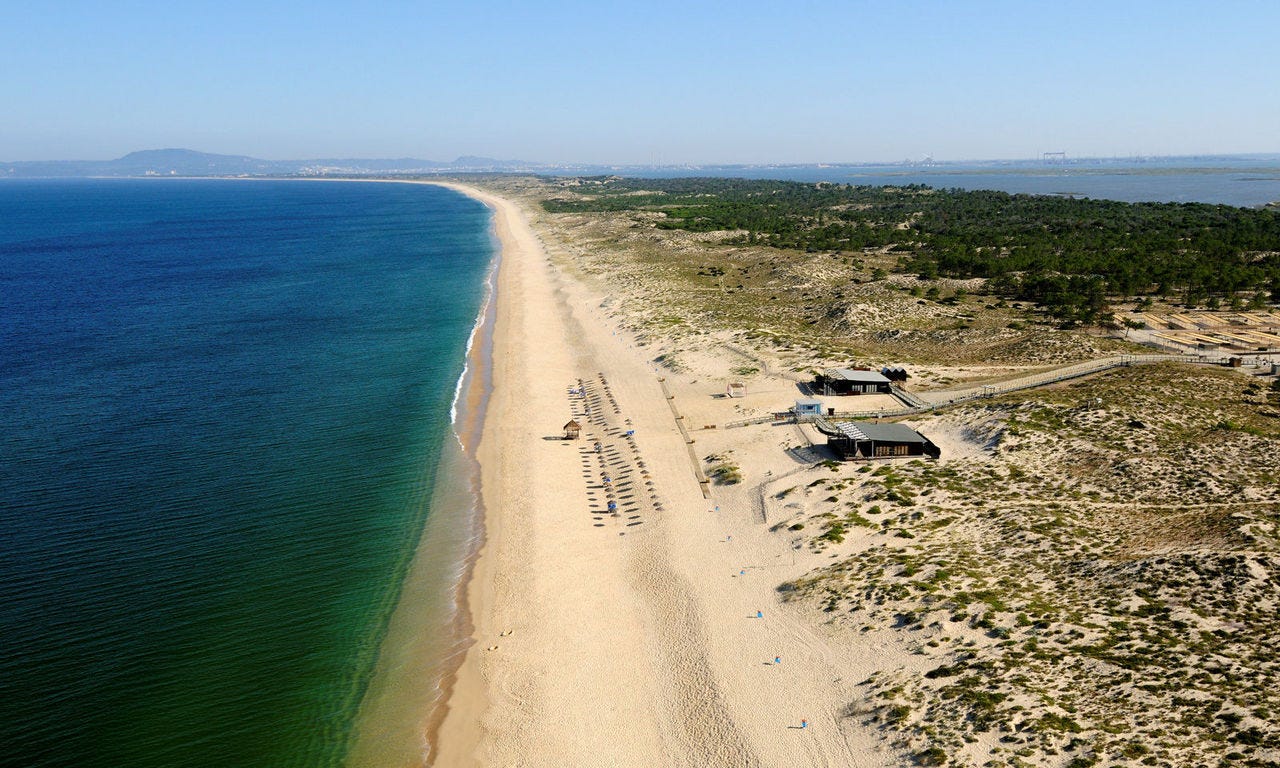Investigation launched into beach access restrictions in Grândola coast
The Tróia-Melides strecht of sand was once hailed as Europe's best kept secret. But a recent investigation by Expresso revealed that around 80% of it lacks adequate public access.

The Portuguese government has launched an investigation into allegations of restricted public access to beaches along the Grândola coastline, where a surge in luxury tourism developments has sparked criticism from residents, activists, and local officials.
Environment and Energy Minister Maria da Graça Carvalho announced the measure on Monday during the official opening of the bathing season in Carcavelos.
“Beaches in Portugal are public and cannot be fenced off or denied access under any circumstances,” Carvalho declared.
In response to reports of blocked access points and restricted parking, especially in the upscale areas of Comporta and Tróia, the government will deploy inspectors from the Portuguese Environment Agency (APA), the Maritime Authority, and other institutions to ensure legal compliance.
“There are some stretches of the coast where access is still limited. We’re working with the Grândola municipality to improve this, and ensure more points of entry to the beaches,” the minister added.
Growing Access Barriers Along a 45-Kilometer Stretch
Despite laws guaranteeing free public access to coastal areas, on-the-ground assessments suggest a different reality.
A recent investigation by Expresso revealed that around 80% of the 45-kilometer beachfront between Tróia and Melides lacks adequate public access, signage, or parking.
Many areas are surrounded by resorts that control entry through fences, private roads, and limited infrastructure.
One of the most striking cases occurred in Pego, where the Judicial Court of Setúbal recently ordered the reopening of a blocked access road and the immediate removal of gates installed in 2022. Grândola’s mayor, António Figueira Mendes, said the court ruling supports the municipality and the private developers who challenged the road closure.
However, Mendes also denied that any beach in Grândola had been privatized and welcomed the government’s inspection, asserting, “If any developer attempts to create exclusive access to a beach, they will not succeed. The municipality will not authorize such restrictions.”
Residents and Activists Demand Change
Local residents have long raised concerns over increasing costs and accessibility barriers. The ferry crossing from Setúbal to Tróia, a necessary route for many, has become prohibitively expensive—€21 for a car and driver, plus €5.50 per additional passenger—pricing out families. Passenger numbers have fallen by more than 50% in two decades.
Ana Rodrigues, a Setúbal resident, told Expresso that taking her children to the beach now costs nearly €50. “When I was a teenager, we went to Tróia all the time. Now, it’s almost impossible,” she said.
Portuguese singer A Garota Não has voiced similar frustrations in her song Ferry Gold, accusing the tourism boom of fueling “segregation” and “privatization of the Tróia peninsula,” while also damaging sensitive dune ecosystems.
Environmental and Legal Concerns
Environmental groups warn that luxury developments, especially those granted Project of National Interest (PIN) status since 2002, have devastated protected areas. According to the NGO ZERO, 76% of Grândola’s National Ecological Reserve has been lost to resort construction. The geographer Sérgio Barroso criticized the planning process, stating that “these projects should never have been approved without guaranteed public access.”
Further south, between the Pestana resort and the upcoming “Na Praia” development by the Zara heiress, access is limited to internal resort roads. While the APA confirmed that a public footpath will be available near Pestana, it is currently only usable by emergency vehicles. Meanwhile, the wooden fencing around “Na Praia” stretches for 3 kilometers, with no parking or pedestrian access.
Call for Systemic Solutions
Opposition leaders and transport regulators have called for more sustainable and inclusive mobility solutions. In 2023, the mayors of Setúbal, Alcácer do Sal, and Grândola urged the government to integrate the ferry crossing into the Passe Navegante public transport pass. Despite support from the national transport authority, no progress has been made. The monthly ferry pass remains at €99.30.
Luís Vital Alexandre, opposition councilor and Socialist Party candidate for Grândola, criticized the local government’s inaction and called for “a real mobility plan, with designated parking and positive discrimination for local residents.”
Government Vows to Act
Minister Maria da Graça Carvalho emphasized that the state has a responsibility to uphold the law: “There are no private beaches in Portugal. Any attempt to limit or obstruct public access will be identified and addressed.”
The ongoing inspections will determine whether legal violations have occurred, and whether resort developers or property owners have unlawfully impeded access. While the beaches may be public by law, the reality on the ground suggests a growing divide between principle and practice—one that the Portuguese government now seems determined to bridge.



